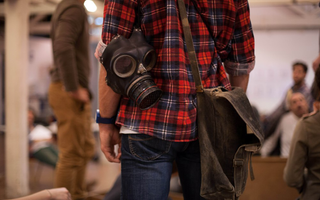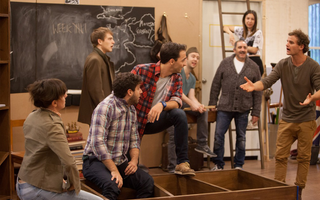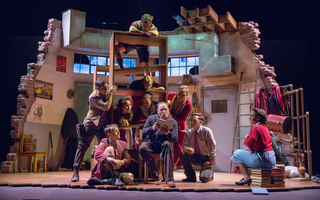Act I
A kingdom for a stage, princes to act
And monarchs to behold the swelling scene!
Prologue
The play begins with a prologue; the Chorus asks the audience watching the play to suspend their disbelief and ignite their imaginations as they are transported across vast distances and through epic scenes of monarchy and warfare.
In the first act of the play, a bishop and archbishop discuss Henry’s sudden transformation and the significant shift towards regal maturity we see in his character now versus when we last encountered him, as Prince Hal in Henry IV Parts I and II.
Since becoming King, Henry has gone from a wayward youth to “sudden scholar” (Act 1, Scene 1). During an audience with the nobility and church leaders, the Archbishop of Canterbury explains at length why Henry has a legitimate claim to the French throne. The bishops and nobility urge Henry to invade France. A French ambassador enters, bearing a gift from the Dauphin, the heir to the French throne, in response to Henry’s claim to a number of French dukedoms. The ‘gift’ is tennis balls, a mocking reference to Henry’s past life of sport and debauchery. Henry, provoked, announces his decision to invade France.
Act II
In cases of defence ‘tis best to weigh
The enemy more mighty than he seems.
Dauphin, Act 2, Scene 3
We are greeted once again by the Chorus who provide a prologue for Act II. This time the Chorus asks the audience to imagine England spurred into preparations for war and the forming of a conspiracy plot to assassinate the King. Finally, the audience is asked to send their imaginations to a pub in South Hampton, England.
In this pub we meet some of Henry’s former drinking buddies. Amidst their squabbling, they learn of the condition of Henry's former friend and companion, Falstaff, who is said to have fallen ill over the heartbreak of being abandoned by the now King Henry.
Henry has discovered that three of his friends – Cambridge, Scroop and Grey – are part of a French conspiracy plot to assassinate him. Henry reveals their treachery, has them arrested, and condemns them to death, before leaving with his army for France.
Meanwhile, Falstaff has died, and his friends Pistol, Bardolph, Nym and Hostess Quickly are grieving for him. The men leave to join the English forces, hoping to bring home loot from the war.
In the French palace, King Charles expresses concern at the English advance, but the Dauphin believes Henry is too “vain, giddy, shallow, humorous” (Act 2, Scene 4) to be a real threat. Exeter, an English ambassador, arrives with a message from Henry, telling King Charles to surrender his crown. Charles does not give an immediate answer.
Act III
Once more unto the breach, dear friends, once more;
Or close the wall up with our English dead.
Henry V, Act 3, Scene 1
The prologue now sends our imagination to the voyage of the English forces across the channel to a coastal city in France, Harfleur. Henry rejects Princess Katherine and an unsatisfactory dowry as an offering of peace from the French. At Harfleur, Henry rallies his armies in the relentless seige of the town, he calls upon them to “Be like bloodthirsty men”. Harfleur is taken with little resistance. A young boy criticises the pub-folk who have travelled to France to loot the spoils, leading to Bardolf being arrested and eventually hanged for these crimes. Henry shows little remorse in putting to death an old friend.
The seige on Harfleur exhausts the English forces, and Henry replies honestly of their weakened state to a threat from the French King. On the French side, we see Katherine and her maid learning and practicing English. In the French court the King calls on all his lords to rally and overwhelm the English forces with more troops. By the end of the act, the French forces are ready for battle in the open field.
Act IV
... few die well that die in a battle...
Williams, Act 4, Scene 1
On the eve of battle, the Chorus describes the confident French playing dice while the despondent English sit in dread of morning. Henry wanders the English camp in disguise. He finds that many of his soldiers are dispirited. Henry, still disguised, challenges a soldier who is vocal in his criticism of the King to a duel, should they survive the battle. Alone again, he soliloquises about the pressure and responsibility of being a King and prays for victory.
The morning arrives and the French army make their preparations with enthusiasm. The English are outnumbered five to one, “a fearful odds” (Act 4, Scene 3). Henry encourages his men with the promise of glory if they survive. The French ambassador gives Henry a final chance to surrender, which he refuses.
As the battle rages offstage, snatches of passing action occur onstage. Pistol spares a French soldier’s life in return for two hundred crowns; The Dauphin and his companions declare that France is losing the battle; Henry learns that the Duke of York and Earl of Suffolk have died; and Fluellen and Gower discuss Henry’s decision to have all the French prisoners of war slain. Finally, King Henry enters and is approached by the French ambassador, who declares that “The day is yours” (Act 4, Scene 7). Henry expresses joy and relief at winning the Battle of Agincourt.
Henry forgives the soldier who accepted his challenge the previous night. The numbers of the dead are revealed: France has lost 10,000 men, and 1,500 have been taken prisoner. In contrast, the English have lost less than 30 men.
Act V
... that the contending kingdoms
Of France and England, whose very shores look pale
With envy of each other's happiness,
May cease their hatred...
King of France, Act 5, Scene 2
The Chorus describes the English returning home victorious, and Henry’s eventual return to France. In a brief interlude, Fluellen fights Pistol for insulting him. The French and English monarchs and noblemen meet and express their shared wish for a return to peace. Queen Isabella, King Charles’ wife, makes a prayer that enmity will transform into love.
Henry is ready to make peace with France as long as he can become heir to the French throne. While the French King and Queen read over the conditions of peace offstage, Henry remains onstage to woo the French Princess Katherine, who is his “capital demand” (Act 5, Scene 2). Henry declares his love to the princess, and she expresses her feelings ambiguously in broken English before accepting his proposal of marriage. The French King returns, having accepted all of Henry’s demands. Henry is given the hand of Katherine in marriage and named heir to the French crown. Henry seals the treaty with France by kissing his new bride.
Now that the action of the play is over, the Chorus ends by telling the audience that King Henry VI was born from the marriage of Henry V and Katherine. We learn that Henry V died while his son was an infant, and that during his reign, Henry VI “lost France and made his England bleed” (Act 5, Scene 2).





